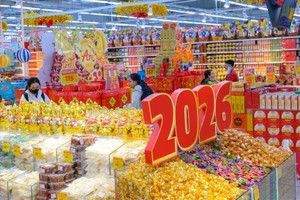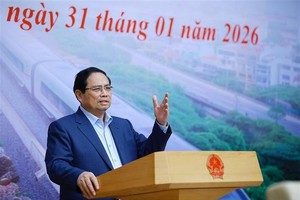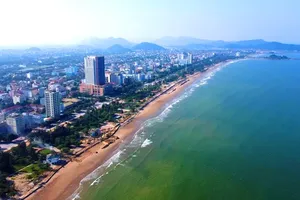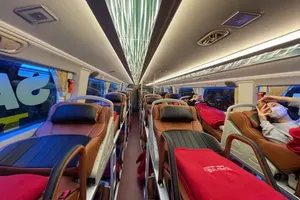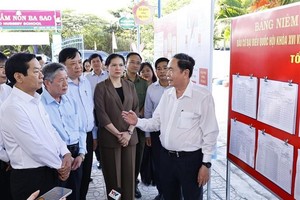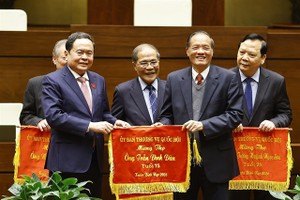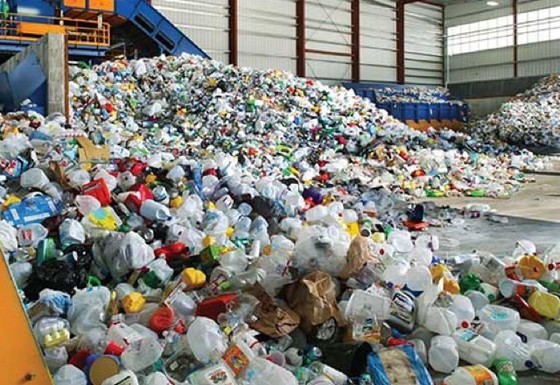 |
Illustrative photo |
Some 13 domestic industry associations and the American Chamber of Commerce (Amcham) continued to send dispatches to 9 ministers including the Ministry of Natural Resources and Environment (MONRE), the Ministry of Industry and Trade, the Ministry of Justice, the Ministry of Construction, the Ministry of Agriculture and Rural Development, the Ministry of Finance, the Ministry of Transport, the Ministry of Planning and Investment and the Government Office and the Vietnam Chamber of Commerce and Industry (VCCI).
In their document to ministers and VCCI, business associations proposed to consider and remove two major obstacles in the draft cost norm for recycling (Fs) of discarded products and packaging.
According to the provisions of the Law on Environmental Protection, starting from 2024, manufacturers and importers must carry out the responsibility of product recycling and discarded packaging (EPR). To fulfill this responsibility, enterprises can choose to organize the recycling of products and packages or make financial contributions to the Vietnam Environmental Protection Fund to support recycling.
The associations affirm their full support for environmental protection policies toward a green economy and a circular economy. However, according to the associations, the draft Fs recycling cost norm which was submitted to the Prime Minister by the Ministry of Natural Resources and Environment on July 27 had proposed unreasonably high Fs costs causing great difficulties for enterprises despite some changes compared to the original.
Specifically, the draft has stated that some Fs recycling cost norms in Vietnam are higher than the average Fs level of 14 Western European countries. For example, the cost of aluminum and glass recycling is 1.26 times higher and 2.12 times higher while Vietnam's recycling cost should be only 1/2-1/3 of Western Europe because Vietnam's labor cost is only 1/10 of Western European countries.
Some 13 industry associations proposed to adjust the cost of recycling Fs more reasonably which should be based on the research of Vietnam Recycling Alliance PRO, Vietnam's recycling practice and the average recycling fee in the market, review the coefficients applying the norm.
These associations believed that the Fs cost in the draft is unreasonably high because the circular economy has not been applied to calculate Fs without deducting the recoverable value. For instance, the recycling fees for paper, plastic and metal packaging are estimated at VND6,127 billion per year. More than 50 percent of the payable recycling fees about VND3,064 billion annually is to support the recycling of high-value packaging such as metal packaging, and carton paper.
Whereas, official recyclers are making great profits. Those recycling aluminum cans have been making a profit of about VND700 billion (US$ 29,308,164) to VND1,286 billion a year while their peers recycling iron and paper packaging are also very profitable.
This happened because policy makers completely ignored the profit factor of the recycling business from recycled materials or the recovery value of the packaging.
Enterprises are burdened with many trillions of Vietnamese dong in recycling fees for other types of packaging, transportation, and waste products, they have had no choice but to push up product prices, especially in the current difficult economic situation.
By adjusting the applicable norm coefficients, according to the associations, the recycling fee for 3 types of paper, plastic and metal packaging alone will be reduced from VND6,127 billion to VND3,146 billion. This is a way to remove difficulties for businesses, reduce pressure on consumers, and still ensure the goal of environmental protection.
Moreover, these associations continued to change the method of payment of recycling contributions from advance payment at the beginning of 2024, to final settlement according to the actual amount at the end of the year so that businesses can still fulfill their environmental responsibilities while reducing difficulties.
Additionally, the government should allow businesses to combine both self-recycling and paying for recycling support in the same year for the same type of packaging and discarded products, instead of being forced to choose one of the two methods.
Associations that have jointly signed official documents include the Food and Foodstuff Association in Ho Chi Minh City, the Association of Food Transparency, the Vietnam Association of Motorcycle Manufacturers (VAMM), the Vietnam Automobile Manufacturers' Association (VAMA), the Vietnam Textile and Apparel Association, the Vietnam Dairy Association, the Vietnam Tea Association, the Vietnam Association of Seafood Exporters and Producers (VASEP), the Vietnam Plastics Association.
By Van Phuc – Translated By Anh Quan

